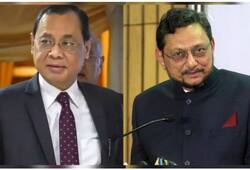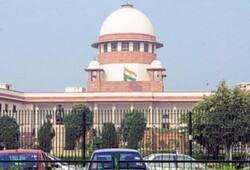Madhya Pradesh High Court
(Search results - 4)IndiaNov 18, 2019, 8:39 AM IST
Justice Sharad Arvind Bobde takes oath as 47th CJI
After the retirement of CJI Ranjan Gogoi, Justice Sharad Arvind Bobde has been sworn in as the next Chief Justice of India. He was sworn in as Chief Justice of Madhya Pradesh high court on October 16, 2012.
IndiaOct 18, 2019, 9:49 PM IST
From Pakistan’s brush with being blacklisted to CJI Gogoi’s retirement, watch MyNation in 100 seconds
Candidates of Maharashtra have stopped campaigning in the interior areas of Gadchiroli, Aheri and Armori after Maoists have called for a boycott of the Assembly polls. Finance minister Nirmala Sitharaman was in Washington attending the annual meeting of the International Monetary Fund (IMF) and the World Bank. The global watchdog Financial Action Task Force strongly urged Pakistan to complete its action plan by February 2020, until which the country will remain on its grey list. Watch MyNation in 100 seconds for the top headlines of the day from across the country.
IndiaOct 18, 2019, 1:40 PM IST
CJI Ranjan Gogoi recommends Justice SA Bobde as his successor
Chief Justice of India Ranjan Gogoi will retire on November 17 and as per tradition, he has recommended his immediate successor - Justice SA Bobde. Justice Bobde is number 2 in seniority after Justice Gogoi and is a former Chief Justice of the Madhya Pradesh High Court.
IndiaMar 4, 2019, 3:30 PM IST
Supreme Court makes new rule of ownership of temples
The Supreme Court clarification begs a converse question: If Hindus need to prove a temple was built of private funds, failing which its control will go to the government, does the highest court of the country mean that all the temples in the country were built by CPWD and PWD, which makes the government a claimant of those properties and, therefore, an arbiter of their rules?











![Disha Patani's sister Khushboo Patani posts picture of her army life [PHOTOS] ATG](https://static-ai.asianetnews.com/images/01hwa1z5ew0902paqadqqj0yzq/fotojet---2024-04-25t124825-715_100x60xt.jpg)

![Salman Khan sets stage on fire for Anant Ambani, Radhika Merchant pre-wedding festivities [WATCH] ATG](https://static-ai.asianetnews.com/images/01hr1hh8y86gvb4kbqgnyhc0w0/whatsapp-image-2024-03-03-at-12-24-37-pm_100x60xt.jpg)
![Pregnant Deepika Padukone dances with Ranveer Singh at Anant Ambani, Radhika Merchant pre-wedding bash [WATCH] ATG](https://static-ai.asianetnews.com/images/01hr1ffyd3nzqzgm6ba0k87vr8/whatsapp-image-2024-03-03-at-11-45-35-am_100x60xt.jpg)


